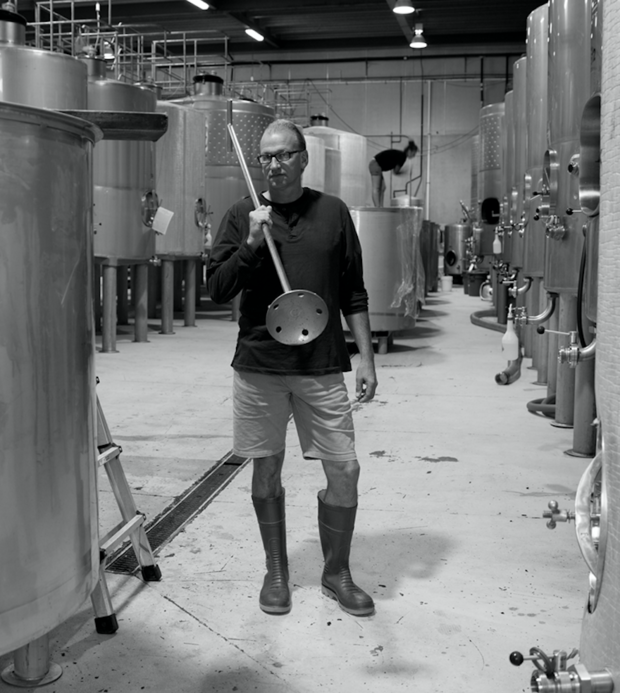
Interview: Warren Gibson, chief winemaker Trinity Hill
Trinity Hill winemaker Warren Gibson muses on the future of New Zealand's wine industry
As one of New Zealand's leading winemakers, you might expect an evening with Warren Gibson to be a slightly formal affair. Yet the producer of Trinity Hill's flagship Homage Syrah - first vintage 2002 - is disarmingly jovial as we settle into Portland restaurant for a vertical tasting of Homage, followed by dinner.
The usual concentrated sipping, sluicing, slurping, swilling and spitting begins, the assembled guests paying due attention to 5 vintages of Homage; 2014, 13, 10, 9 and 7 are up for grabs, made from 42 hectares of vines in the Gimblett Gravels sub-region.
The wine was conceived sentimentally - Homage pays tribute to the late Gerard Jaboulet, who trained Trinity Hill founder John Hancock in 1996 and allowed him to work besides him at the cellars in Tain L'Hermitage. His parting gift was cuttings of Syrah from La Chapelle and Viognier from Côte-Rôtie - et voila, Homage was born.
Today, the 2009 is the standout, at least in my view; bursting with red berry fruit, hints of game and fresh herbs, the wine's balance, structure and elegance is superb.
But does it sell?
"Syrah is becoming an easier sell, both internationally and domestically, although it has been a bit of a hard slog," admits Gibson. "Prestige Syrah from New Zealand is never going to be as easy to market as say a Bordeaux blend, although Homage is now doing extremely well, particularly in the UK and US." Nonetheless, Syrah still only accounts for 1% of total wine production in New Zealand, and just 0.5% of wine exports.
There's no shortage of Merlot in Hawke's Bay though. Alexander Payne's film 'Sideways' famously put the squeeze on Merlot when it was released in 2004, but what does Gibson think about the variety's future in Hawkes Bay?
"I think that truthfully, Gimblett Gravels is more suited to the Cabernet family and there is probably too much Merlot in Hawkes Bay," is Gibson's surprising riposte. This stops me in my tracks - after all, Trinity Hill planted Merlot and use a decent percentage of it in their Bordeaux blend, The Gimblett. So the remark can't be allowed to slip by.
"Of course, you can make good wine from Merlot in Hawkes Bay and it's an essential blending partner for The Gimblett, but as a varietal it can sometimes be a little boring - that's just my opinion though," clarifies Gibson, erring on the side of caution.
Our host has no qualms about sharing his views on Kiwi Malbec, however. A tiny percentage is currently planted in Hawkes Bay, although Gibson believes that it may be unsuited to the terroir. " I remember visiting some colleagues in Argentina and their disbelief at the clonal selection and style of wine made in New Zealand," says Gibson. "I'm not sure it has a natural home here - consumers probably expect something more fleshly and ripe, a style that is available in abundance in Argentina."
Of course, for some time now, key members of the UK trade have levied the epithet "one trick pony" at New Zealand, believing that the country needs to move on from its massive reliance on Sauvignon.
Yet Gibson argues that "trying to be all things to all men," is equally not to the country's advantage. "Trinity Hill has experimented with several varieties like Arneis, although they have never been released commercially. I think there was a tendency for some producers to believe that they had to have everything in the portfolio - quite a few wineries were buying-in grapes to make a rosé style for example, putting increased pressure on grape prices. New Zealand doesn't need gallons of cheap rosé."
As the evening draws to an end, I muse with my colleagues over the future of New Zealand's red wine industry, and the necessity of dispelling the Marlborough Sauvignon Blanc cliché. Pinot Noir is, of course, the next real winner and now accounts for over 70% of the country's red wine output. The only problem, as Gibson observes, is that: "New Zealand Pinot Noir is simply too expensive, due to the limited volumes available."
Not so for the superlative Gimblett Gravels Syrah, which at £17.95 (2014) is the veritable bargain of the season.




